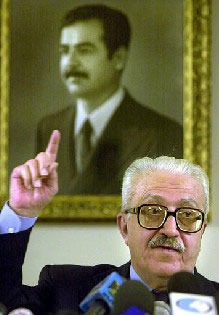"I am carrying my pistol to confirm to you that we are ready to fight the aggressors," Aziz said then. "American soldiers are nothing but mercenaries and they will be defeated." Although he was one of Saddam's most loyal aides, Aziz, like most non-Tikritis, had virtually no power, U.S. officials have said. That could explain his longevity in Saddam's inner circle - without an independent power base, he posed no threat. In recent years Aziz did not have the international profile he had in the 1990-91 Gulf crisis when, as Iraqi foreign minister, he was virtually "Mr. Iraq" to the world's media. Saddam promoted him after the Gulf war to deputy prime minister, forcing him to relinquish the foreign ministry portfolio. Some believe this reshuffle had to do with Saddam's not liking a Cabinet minister to become too well known. Others point to the fact that Saddam's son Odai did not like Aziz. Odai's newspaper, Babil, often criticized foreign policy. In 1996, Aziz's son Ziad was arrested for corruption in what Baghdad insiders saw as a turf battle between Ziad and Odai, who was equally known for graft. However, Tariq Aziz retained weight within the government. He was Saddam's deputy on the foreign affairs and media committees, in which positions he interpreted Saddam's policies to the ministers concerned. He also conducted the government's negotiations with the U.N. weapons inspectors. When Saddam fired Aziz's replacement as foreign minister, Mohammed Saeed al-Sahhaf, in 2001, he appointed Aziz as acting foreign minister for four months until Naji Sabri was given the post. Al-Shahaf's new post was as Iraq's information minister, which he used during the latest war to denounce the U.S.-led invasion and famously deny that American troops were in Baghdad after they had already captured the capital's international airport. Born in 1936 near the northern city of Mosul, Aziz studied English literature at Baghdad College of Fine Arts and became a teacher and journalist. He joined the Baath Party in 1957, working closely with Saddam to overthrow British-imposed monarchy. Aziz changed his name from Mikhail Yuhanna. In Arabic, Tariq Aziz means "glorious past." He was wounded in a 1980 assassination attempt by an Iranian-backed Islamic fundamentalist group named ad-Dawa Islami, the Islamic Call. Members of the group threw a grenade at him in downtown Baghdad, killing several people. The attack was one of several Saddam blamed on Iran, part of his justification for his expulsion of large numbers of Shiite Muslims and his September 1980 invasion of Iran. Aziz was instrumental in restoring diplomatic relations with the United States in 1984 after a 17-year break. He had met in 1983 with Donald H. Rumsfeld, then a private envoy from President Reagan and now defense secretary. At the time, the United States backed Iraq as a buffer against Iran's Islamic extremism. The United States broke off diplomatic relations with Saddam's government for good after Iraq invaded Kuwait in 1990, which led to the Persian Gulf War. Aziz was a frequent spokesman for Saddam during that war, too, contending Iraq's invasion of its smaller neighbor was justified.
|
